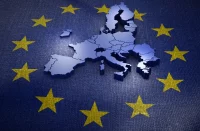The November 28 US-EU summit deserves to be called a milestone in the recent geopolitical history, considering that during the forum the US dictatorial handling of Europe was disguised so thinly for the first time since President Obama moved into the White House. Moreover, the US Administration openly cited its domestic-policy regards – the prospects for President Obama’s re-election – as the reasoning behind the conduct when it urged Brussels to take bold steps to keep Euro afloat. The situation appeared completely grotesque, in part due to the fact that Europe’s current debt headaches resulted from the crisis that actually spilled across the world from the US. Washington and Brussels being nominally equal partners, George Orwell’s concept that some may be more equal than others must not be discounted yet.
All that could be gathered from the deliberately vague statements released by the White House and the US Department of State in the run-up to the summit was that US President B. Obama invited President of the European Council Herman Van Rompuy, President of the European Commission José Manuel Durão Barroso, and EU High Representative for Foreign Affairs and Security Policy Catherine Ashton to discuss a broad range of issues of mutual interest. The media, though, offered a sharper picture: according to Reuters, for example, “President Barack Obama pressed the European Union officials … to act quickly and decisively to resolve their sovereign debt crisis …” because “avoiding contagion from Europe’s crisis is critical for Obama, whose re-election prospects next November hinge on his ability to shield the U.S. economy from another downturn…”. Heather Conley from the Center for Strategic and International Studies believes that Obama’s frequent and largely unannounced contacts with German chancellor A. Merkel and French president N. Sarkozy are meant to ensure Washington’s guiding role vis-a-vis Europe. The TransAtlantic Business Dialogue, a group counting in its ranks such giants as Microsoft, Coca Cola, Intel, Deutsche Bank, Siemens, and Ford, aired a similar view in an open letter on the occasion of the US-EU summit, stressing with diplomatic caution the importance of the exchange of ideas between the US and Europe.
The linkage between the US-EU relations and the US presidential elections, or, speaking precisely, the trans-Atlantic relations and President Obama’s second-term bid, is a totally new phenomenon. Up to date, Washington used to refrain from unabashedly burdening its European partners with a purely domestic US agenda.
The main reason why Washington is perturbed by the difficulties currently experienced by the Eurozone is that doubts over the future of Euro send the US dollar climbing and therefore limit the Federal Reserve’s space for maneuver. Generally, a strong dollar is not a blessing for the US economy, as Washington’s recurrent yuan-value skirmishes with Beijing, the world’s top holder of US bonds, clearly showed. Under a hypothetic scenario, the EU and China could use their financial leverage to bring down the whole US economy, and, with the presidential poll drawing closer, Obama naturally worries about being held hostage by Brussels and Beijing. At the moment this fear, rather than compassion for the financially embarrassed Greece, Italy, and Spain, makes Washington focus on Europe. By the way, one of President Obama’s former campaign pledges that will in the foreseeable future prompt tough questions from his constituency was to have the US export double by 2014.
Obama’s Administration inserted into the summit’s resolution a passage on its confidence in Europe’s ability to cope with the crisis provided that Brussels finds the necessary political will. US Secretary of the Treasury Timothy Geithner, furthermore, spelled out bluntly what, in the context, Washington expected from the US as a whole and the EU economic heavyweights in particular: “Even if you take a very conservative, pessimistic estimate of the ultimate cost of resolving this crisis for Europe, it is completely within the capacity of the stronger members of the euro area to absorb those costs”. Geithner also said that the EU should as quickly as possible “create a firewall against the spreading crisis”.
Washington’s anti-crisis recipes were not rich in unanticipated ideas and revolved around giving a bigger role to the European Central Bank. The possibility is the subject of heated debates among the EU top brass and recently surfaced in a report released by the Organization for Economic Co-operation and Development (OECD). In terms of radicalism, the plan is no match to the suggestion made by former chief of the European Bank for Reconstruction and Development Jacques Attali to institute a common European budget as a replacement for the national budgets of all EU countries. Attali’s forecast is that otherwise a collapse of Euro would – much to the disappointment of US President Obama – follow already this year.
However, Germany, the European powerhouse whose own bonds offering proved a complete fiasco a short time ago, hardly welcomes the idea of “creating the firewall against the spreading crisis” with its taxpayers picking up the tab. The German government immediately voiced strong opposition to Barroso’s recent proposal that the EU issue common “anti-crisis” bonds: German economics and technology minister Philipp Rösler described as irresponsible the push to shift the debt burden of some EU countries to others.
In fact, the US relations with the key EU countries – Germany and France – are not entirely dominated by the financial theme. Over the past years, the Washington-Berlin-Paris triangle remained the epicenter of intricate and unpredictable geopolitical dynamics within the Euro-Atlantic community. The game started in 2003 when the US and Great Britain brushed off the German and French objections and launched the Iraqi campaign. In the process, Washington showered “the old Europe” with invectives and no doubt added the episode to its permanent grievances list. The US response move came as the offensive against Libya was unfolding – Washington initially threw its support behind Sarkozy’s militant rhetoric just to withdraw at the moment when the situation called for direct involvement in Libya’s domestic conflict. Discord ensued between France and Germany, the latter staying out of the fight, and seriously told on the already shaky European unity. Washington, in the meantime, had Europe accomplish the US geopolitical objectives plus cover the related expenses. Director of foreign policy and defense at the Centre for European Reform Tomas Valasek says the campaign in Libya marked an unforeseen triumph of the US diplomacy whose a priori mission was to convince Washington’s European allies to chip in militarily. As a side-effect, severe damage was done to the Berlin-Paris alliance which was just inching through its early formative phase. The case reflected Washington’s dual European strategy aimed at both undermining the unity within the EU and attracting individual EU countries into the orbit of the US policies.
Washington – with Democrats or Republicans at the helm – sees Europe as an instrument for implementing its own geopolitical designs and addressing its own problems. Strictly speaking, even the origins of Europe’s current downturn can, to a significant extent, be traced back to Brussels’ attempts at resource-draining geopolitical projects in the Balkan region, across the post-Soviet space, in North Africa, and in the Middle East, all of which were more or less inspired by the US.
Source: Strategic Culture Foundation














Comments